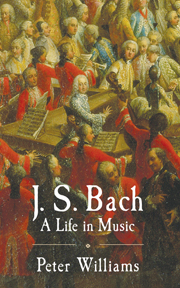Book contents
- Frontmatter
- Contents
- Preface
- Acknowledgments
- Map of Northern Germany in the time of J. S. Bach
- Map of Thuringia and Saxony in the time of J. S. Bach
- 1 Early years 1685–1703
- 2 First appointments 1703–8
- 3 Weimar 1708–17
- 4 Cöthen 1717–23
- 5 Leipzig, the first years
- 6 Leipzig, the middle years
- 7 Leipzig, the final years
- 8 Observations, descriptions, criticisms
- Epilogue
- Postscript
- Glossary
- List of references
- Index of works (BWV)
- Index of names
3 - Weimar 1708–17
Published online by Cambridge University Press: 10 December 2009
- Frontmatter
- Contents
- Preface
- Acknowledgments
- Map of Northern Germany in the time of J. S. Bach
- Map of Thuringia and Saxony in the time of J. S. Bach
- 1 Early years 1685–1703
- 2 First appointments 1703–8
- 3 Weimar 1708–17
- 4 Cöthen 1717–23
- 5 Leipzig, the first years
- 6 Leipzig, the middle years
- 7 Leipzig, the final years
- 8 Observations, descriptions, criticisms
- Epilogue
- Postscript
- Glossary
- List of references
- Index of works (BWV)
- Index of names
Summary
HEARD BY A DUKE
In the following year, 1708, a visit he made to Weimar, and the opportunity he had there to be heard before the then Duke, led to the position of Chamber- and Court-Organist being offered him, of which he took possession straightway.
(Obituary)Does this mean that according to family lore it was by chance that Bach was heard by the duke? This would excuse him for taking another job so soon – or, for the readers of Walther's Lexicon biography, explain the date it gives for one job (1707) being so close to that of another (1708). By convention, the court-position he was offered would necessarily be as ‘organist’, but duties would not be exclusively in chapel or on the organ, rather those of a ‘general keyboard-player’: the Obituary's sentence need not even imply that it was (only) on the organ that he played for the duke.
There was nothing unusual in musicians visiting ducal and other courts hoping to be heard, and a gifted young organist from an important church in the Free Imperial City of Mühlhausen had much in his favour. Yet while a duke would appoint without the need to invite applications, hold auditions in public or have candidates vetted by committees, a post could not have been offered unless it was vacant or about to become so.
- Type
- Chapter
- Information
- J. S. BachA Life in Music, pp. 70 - 121Publisher: Cambridge University PressPrint publication year: 2007

